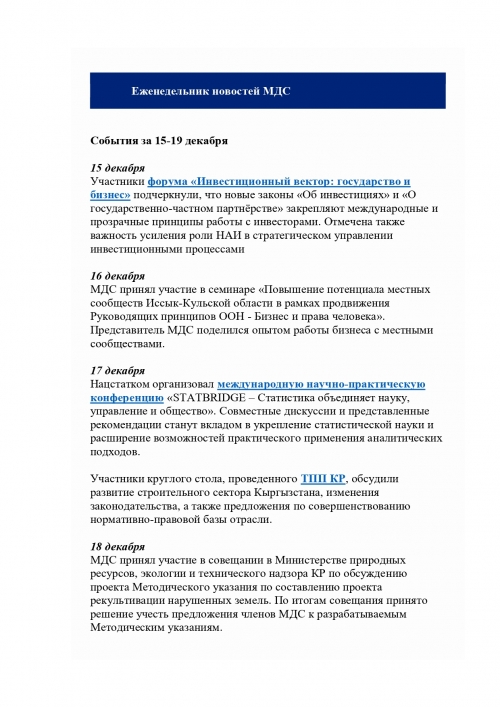Analysis /
Articles /
Kyrgyzstan and Turkmenistan reviving business relations
Bilateral trade between Kyrgyzstan and Turkmenistan increased by 23.7% from January to May 2016 and amounted to $5.2 million, Economy Minister of Kyrgyzstan Arzybek Kojoshev said at a meeting of the Kyrgyz-Turkmen intergovernmental commission held in late August in Bishkek. Turkmenistan accounted for 0.2% of Kyrgyzstan's total foreign trade in 2014, an increase by 46.3% compared with 2013.
In recent years, relations between the two countries have become more active both at the level of governments and businesses. The Kyrgyz President’s visit to Turkmenistan in November 2014 and the Turkmen President’s visit to Bishkek in August 2015 enhanced bilateral cooperation in all areas.
Kyrgyzstan imports nuts, vegetable oil, polymers, propylene, fertilizers, raw sheep skins, and vegetables from Turkmenistan. Since the beginning of this year, Turkmenistan has exported textiles worth $1.4 million to Kyrgyzstan.
The main exports from Kyrgyzstan to Turkmenistan are electrical appliances, agricultural products and plastic products.
President Berdymukhammedov stressed the growing role of tourism at the previous meeting with Atambayev. Berdymukhammedov then suggested building a five-star hotel at Issyk-Kul in Kyrgyzstan, and invited Kyrgyzstan citizens to visit health resorts in Turkmenistan.
Atambayev tasked the authorized representative of the Government in the Issyk-Kul province, Emilbek Kaptagaev, to assist Turkmen businessmen and show them available land for construction of hotels and resorts.
Business collaboration
A large delegation of Turkmen business people recently visited Kyrgyzstan to explore the local market and offer their products here.
Two Kyrgyz-Turkmen joint ventures and 21 projects worth $30 million are now registered in Turkmenistan.
In Kyrgyzstan, 30 Kyrgyz-Turkmen JSCs are registered, of which 11 companies are currently operating. Following a business forum held earlier this year, a Turkmen trading house started operating in Bishkek. There is a great potential of cooperation in the agricultural and processing sectors.
For the first time, Kyrgyzstan has exported one thousand tons of beans to Turkmenistan this year.
It is also necessary to speed up the signing of a Kyrgyz-Turkmen agreement on avoidance of double taxation.
Opening of air links between the two countries would be important for the development of trade and economic cooperation. Kyrgyzstan proposed opening of Ashgabat—Bishkek—Urumqi—Guangzhou flight.
There are preliminary agreements on supply of polypropylene pipes from Turkmenistan to Kyrgyzstan. Turkmenistan is interested in importing Kyrgyzstan’s dairy and meat products, and Kyrgyz garment.
However, skeptics believe that prospects of economic and trade cooperation between Kyrgyzstan and Turkmenistan are almost a zero. The two countries are separated by Uzbekistan and Tajikistan, which hinders Kyrgyz-Turkmen cooperation. For instance, Kyrgyzstan was going to buy electricity from Turkmenistan in 2012 but the Uzbek side, referring to technical difficulties, refused to transit Turkmen electricity through its territory, and Kyrgyzstan was forced to abandon the plan.
Transport cooperation
Kyrgyzstan is interested in joining the Iran–Oman–Turkmenistan–Uzbekistan international transport corridor, and in removing barriers to the transit of goods through Central Asia, Minister Kojoshev said.
An agreement on the establishment of an international transport corridor to connect Central Asia with the ports of the Persian Gulf came into force in April 2016. The so-called Ashgabat agreement was signed by the governments of Iran, Oman, Turkmenistan and Uzbekistan in April 2011. The creation of the international transport corridor was initiated by then Uzbek President Islam Karimov in October 2010 in Ashgabat. In February 2015, a meeting of the Coordinating Council of the agreement’s participating countries approved the accession of Kazakhstan to the transit corridor.
The use of this corridor, which runs from Uzbekistan and Turkmenistan through Iran's Farab and Sarakhs and the Bandar Abbas port to Omani ports, will significantly increase the speed of cargo transportation, optimize transport costs, simplify and harmonize official documents and procedures, and stimulate trade between the countries of Central Asia and the Persian Gulf.
Turkmenistan has started construction of an international high-speed highway and an international airport to meet international standards. The country is also building an international modern port, which will transport any loads through the Caspian Sea.




























